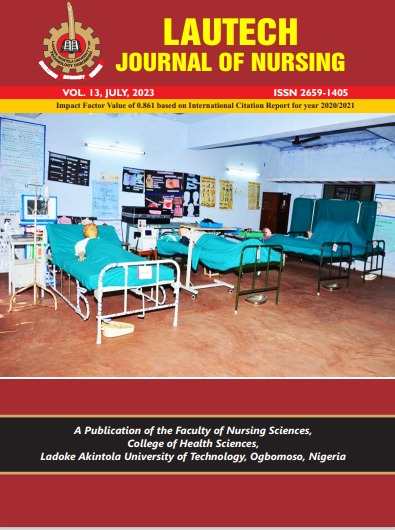The aim of this study was to investigate the implementation of integrated management of neonatal
and childhood illnesses (IMNCI) by midwives in selected primary health centers in Anambra State, Nigeria. The sample consisted of 264 midwives who were randomly selected for participation. Data were collected using a structured questionnaire, and the reliability of the instrument was assessed using Cronbach’s alpha coefficient, which yielded a value of 0.681, indicating good reliability. After data collection, 240 questionnaires were considered suitable for analysis. Data were analyzed using SPSS version 20 for Windows, with descriptive statistics (frequencies and percentages) used for analysis. Hypotheses were tested using Pearson chi-square at a significance level of P<0.05. The
demographic characteristics of the respondents in this study revealed that the majority were aged 20-30 (41.7%), female (99.2%), Christians (96.4%), married (85%), of Igbo ethnicity (84.2%), and from Anambra Central (68.8%). The results indicated a high level of implementation of the IMNCI strategy by midwives in the selected primary health centers (mean score of 3.72). Additionally, the midwives demonstrated a high level of knowledge regarding the IMNCI strategy (mean score of 4.4). Most of the midwives (99.2%) had undergone IMNCI training, with the majority (37.5%) receiving the
training within the past year, for a duration of 1 week, covering all three components of the IMNCI training. The study also identified several factors influencing the implementation of IMNCI, including the use of standardized child health files with IMNCI recording forms (mean score of 3.10), availability of the national essential drug list (mean score of 2.87), improved supervision and monitoring (mean score of 3.90), increased confidence and skills of midwives in under-5
case management through IMNCI (mean score of 4.62), and frequent availability of IMNCI wall charts and chart booklets (mean score of 4.14). Two hypotheses were tested, and the results indicated that there was no significant association between the level of knowledge and implementation of IMNCI (χ2 = 9.64, P = 0.141). Similarly, the training of midwives did not show a significant association with the implementation of the IMNCI strategy. It is worth noting that the IMNCI
strategy can effectively reduce morbidity and mortality among children under five if it is implemented properly and efficiently, with adequate supervision.
- NWANKWO, | PHILOMENA | N. | nwankwophilomena2@gmail.com | +2348039460388, OKEDO, | HENRIETTA | A. | henriettokedo@tansianuniversity.edu.ng | +2348036731512
- Midwives: Integrated Management of Neonatal and Childhood Illnesses
- NWANKWO PHILOMENA N & OKEDO HENRIETTA A


